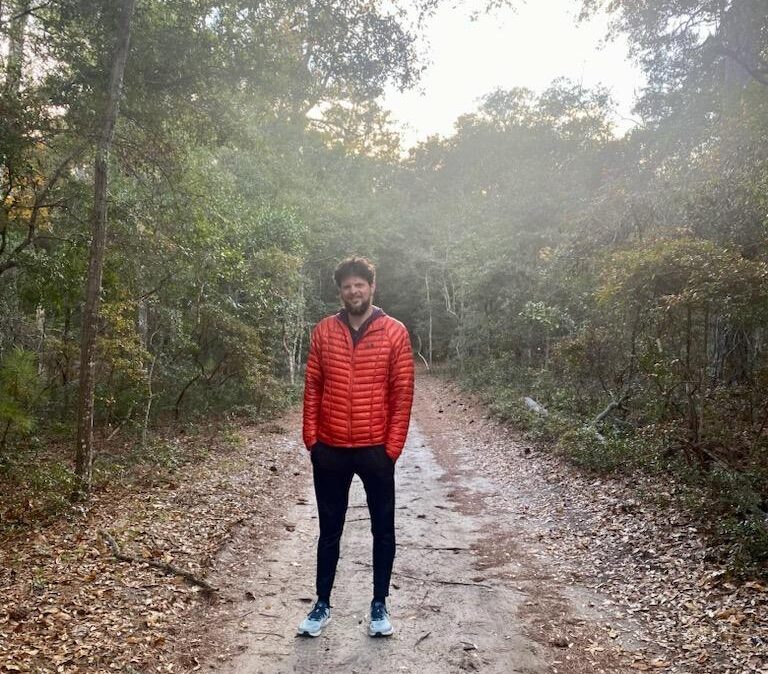
November 24, 2023
Resolving to Be His
Last year, on New Year’s Eve, thirty-seven-year-old Alex Davis made a sole New Year’s resolution. He resolved to visit the Center every month in the year 2023. The year is almost ending, and I have seen Alex on Center quite frequently, but has he really come every month? “Yes,” he exclaims, “sometimes even twice in a month.”
Alex’s story is unique and inspiring in more than one way. He was born to parents who were part of the Chapel Hill Baba group. As a child, Alex lived in Raleigh and came to the Center quite frequently until he was seven. Then, life got in the way and busy schedules replaced trips to the Center. They had Baba pictures in the house, but they never talked about Him. Like many of their generation, Alex feels that his parents were escaping their religious backgrounds. The family’s connection to Baba was very personal and not based in explanation. But as luck would have it, this was only the tip of the iceberg as far as Alex’s connection with Baba would go.
As a freshman, when Alex left for college, a mysterious object ended up in his backpack. It was a Baba book called, God to Man and Man to God. Even though he was reading great books in philosophy classes, somehow this book seemed to have left a deep impact. It answered lifelong questions that his education had failed so miserably to answer so far.
That summer, he read the Wayfarers and God Speaks. “I remember reading God Speaks for the first time and thinking that only one kind of person could have written it. I felt like I’d summited a mountain, and this feeling was only punctured by the tenth chapter where Baba points out that understanding is not the goal.” And yet, while he understood less and less with more and more reading, Alex strived for the appeasement of his “intellectual convulsions” and Baba masterfully provided it through His immense body of literature.
The following year, during his spring break, compelled by his readings, Alex came to the Center. Once he came, he found himself coming back at every opportunity. “I found myself deep in Baba’s lore by then. At the Center, I felt and still continue to feel a psychic security blanket. It appears that thoughts are dampened or accentuated until Baba burns them out. And the presence I feel here is entirely unique to the Center.”
So, when Alex moved back to his hometown of Raleigh after living in New York City for many years, he was excited to be closer to the Center. Sadly, this was just when the pandemic hit. When the Center partially reopened, Alex would follow his impulse and make day visits from Raleigh just to be on the Center grounds. But when the Center reopened completely, Alex saw himself asking why he wasn’t coming more often. That is when he resolved to come every month. “So far it has been a good choice. When I am here, I am already thinking of when I will be coming back. This helps with thinking more about Baba as it is easier to think about Him on the Center than out there in the world,” he confesses.
Alex is singular in his resolve and unfailing commitment. In him, I see a distinctive blend of young and old, effort and grace and a pursuit of the balance of the head and heart that Baba came to create. While he is a “young adult,” that is not a restrictive bracket in his case. “I recognize that my entry way to Baba is less common, especially among young people.” But young or old, to be with Baba is to seek His pleasure. “For me, Baba’s words are a useful way of remembering Him and they help guide me to act in a way that would please Him.”
Time and again, the popular rhetoric has been that no one wants to read anymore, and that young people dislike structure. Alex and I discuss the concept of structure and the lack thereof and how it applies to different personality types on the path. “There are some temperaments who are naturally structured, and some who need it imposed just to stay sane. I am definitely one of them,” laughs Alex. Alex likes to attend seminars about Baba’s words. Baba emphasized the importance of His words and reading specific texts. For Alex such sessions are therapeutic, a type of meditation and a way to remember Baba and gather in His name. “I disagree with the concept that reading might take away from an inner experience, as though this were ever possible.”
The need for structure brings me to wonder about practice. How does one with a natural proclivity toward a practice find himself with a Master without a universally prescriptive practice? “I would draw attention to Baba’s specific use of language as a kind of structural beacon,” he says. “Taking Baba’s Wish as an example: when I start to doubt myself, I can ask myself questions according to His Wish. ‘In this moment, am I trying to help and serve others?’ ‘Am I remembering Baba’s name?’ ‘Am I thinking that Baba has placed me in this situation?’ For me, this rational line of inquiry is both a kind of meditation, and a safety net.”
Alex finds Baba’s rich and full-bodied literature fragrant with pieces of practical advice to live one’s life by. This is his practice and a means to remember and love Him. “We all want to ‘love Baba,’ but love is an active verb, and implies a ‘doing’ as much a subjective feeling. This doing might be interpreted as obedience, and I think the figuring out of what obedience to Baba means is the work of each individual within his life. Our individual lives are the answer to the question, ‘Am I keeping the Wish of the Beloved?’”